Puck and I took a trip to Northern Wisconsin hamlet of Cable to attend the Midwest Fatbike Summit and Grooming Seminar last week that was sponsored by Quality Bicycle Products, Minnesota Off-Road Cyclists (MORC), The Chequamegon Area Mountain Bike Association (CAMBA) and the International Mountain Bike Association (IMBA).
The Thursday drive from Milwaukee was a 6-hour tour of rural Wisconsin that reminded me of why I love this state and lunch at the little road side food trailer called Lola’s Lunchbox in Phillips was the highlight! The server said it was 10 below in the trailer when she opened that morning! That’s Wisconsin for ya!
Our meeting place on Thursday evening was the Lakewoods Resort just outside Cable where we shot the shit for a while as we waited for folks to arrive for the first ride of the weekend on the Esker Trail on the grounds of the now defunct Telemark Resort. The trail highlighted one of the trail grooming techniques that we would discuss the next day done with a snowmobile and a sled made from an old piece of nordic trail grooming gear. BTW, the Cable area is among the most famous nordic ski areas in the country and is the host of the famous American Birkebeiner Ski Race. The proximity of the Birkie trail to the area made this a perfect spot to hold the summit because trail access is certainly an issue around Hayward/Cable.
After the ride John Gaddo, one of QBP’s outside reps, gave a brief introduction talk outlining the activities for the Summit and then introduced the movie Cold Rolled that Salsa and the city of Marquette Michigan made to promote snow biking in the Marquette area. Iv you haven’t seen the movie, here you go!
COLD ROLLED-Full Length Film from Clear & Cold Cinema on Vimeo.
After the movie informal conversation sprang up at the bar about trail building and access issues and the attendees were entertained by the constant stream of one-liners from Lakewood’s bartender, Cary.
The Summit was held on Friday at the excellent facilities of the Rivers Eatery in Cable. Over 100 Land Managers from local, state and federal agencies were in attendance along with numerous members of most of the major trail systems in the Midwest.
Gary Sjoquist, QBP’s Advocacy Director, led the morning portion of the summit that focused on clubs, land managers and individuals who are dealing with access issues related to winter off-road cycling and fat biking as well as presenting information on bikes, gear, demographics and discussion of IMBA’s Fat Bike Best Practices. A key theme in the morning session is the economic impact that a successful trail system can have on a community and the buying power of the trail users.
Gary continued with success stories about mixed use trail systems including the Methow Valley, WA-Nordic/Fat Bike Trail, Michigan Tech University’s Nordic/Fat Bike Trail and Victor, ID and the District 33 Snowmobile/Fat Bike Trail. It is worth noting that due to the varied ownership of land, be it private, state, federal or locally controlled, each trail system will experience different access issues when trying to gain use for fat-bikes.
David Gabrys, 45NRTH’s Brand Manager, gave an update on products and direction at that company mostly bring home the message that the fat-bike segment is experiencing tremendous growth and represents a real opportunity to get more people involved in outdoor activities in local areas that have actively worked to build and promote trail systems for fat-bike use.
Hansi Johnson, IMBAs Midwest Director presented more economic data, mentioned that 80% of IMBA members ride at least weekly and that the preliminary data shows that fat-bike owners ride a similar amount and outlined the “Fat Bike Best Practices” that have been developed over the past year or so that represent a great starting place for those looking to engage land owners and managers when looking for trail access. Hansi also mentioned that the fat-biking community is doing a great job of being proactive about trail access having learned lessons from the less than auspicious start that mountain biking had a couple of decades ago.
There was a brief discussion about the growth of the Fatbike Birkie from an idea presented to a hostile board of directors to the success of the 2013 event that had about 250 participants to the increase to 500 participants for the 2014 event. The damage to the Birkebeiner course was minimal!
Several representatives of local clubs including MORC/Minnesota, Cuyuna/Minnesota, CAMBA, NTN/Marquette, CORPS/Madison, CWOCC/Wausau, COGGS/Duluth, CORBA/Eau Claire and Copper Harbor/Michigan were in attendance and gave updates on the situations in their area including where trails are located how they are used and what access or user group issues they are facing. Look for stories on specific trails in the coming weeks as we go more in depth with people we met at the summit.
A discussion on signage took place with the consensus being that great signage makes for great trails. Besides marking the trails signage can present the conditions under which the trials may be used to insure the integrity of the trail system as a whole.
Just before lunch John Leighton of the American Birkebeiner Foundation presented a raffle giving away 5 entries to the Fat-bike Birkie won by 5 of the attendees.
The afternoon portion of the summit focused on trail grooming with an outdoor display of several different solutions that were presented by the groomers who use both human-powered grooming as well as mechanized grooming to maintain their trails. Again, we will be diving more into several of the solutions that trail maintainers have come up with. It is worth noting that each trail system has its own specific needs and what works at one trail may not work at another. It was really great to hear all the conversations the groomers had as they discussed what works for their system with folks from other areas.
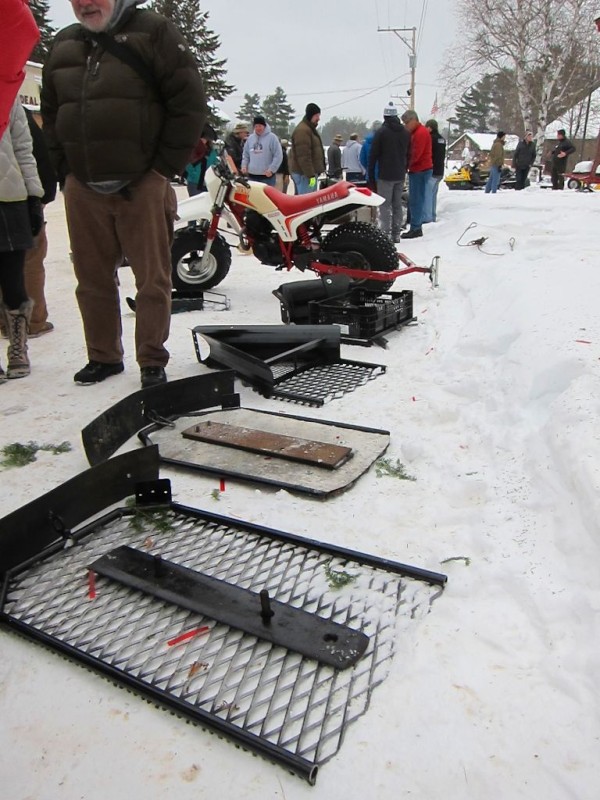
A portion of the impressive array of grooming sleds used at Elm Creek in Minnesota. They are pulled by either the Yamaha Big Wheel shown here or by an older, narrow Yamaha snowmobile.
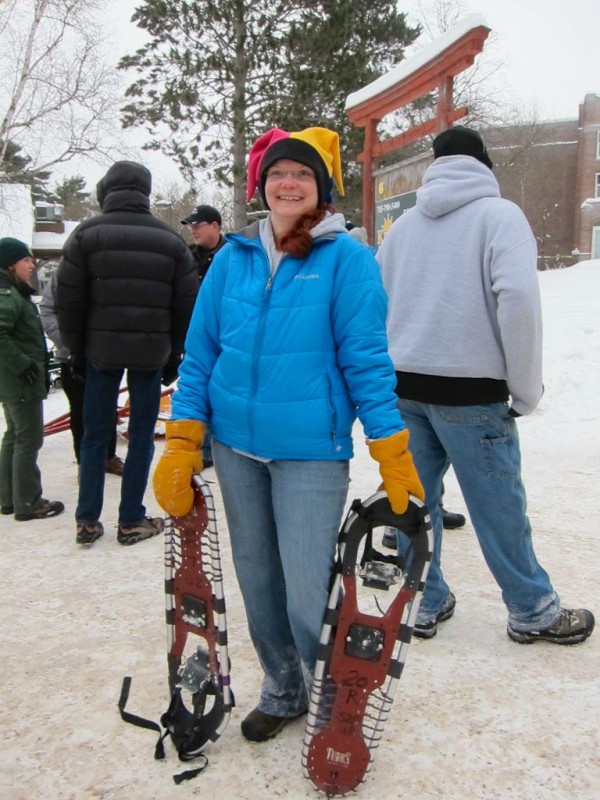
Human-powered grooming at Cuyuna in Minnesota is done by the “Snow Zombies” of which Liz is a proud leader.
The afternoon also presented an opportunity for agency representatives who had never experienced riding a fat-bike the chance to go for a ride on one of the Moonlanders that QBP Rep John Gaddo had brought along.
After the summit we all met at The Sawmill in Seeley for the short ride to the trailhead for another great ride on the CAMBA trails.
Puck and I drove home on Saturday with a stop at one of the trails we discussed at the Summit, Sunny Vale County Park in Wausau. The trail had been groomed that morning and conditions were great. The trails at Sunny Vale are specifically made for fat-bikes only and, in fact, the trails only exist in winter with riding available from December 15th through March 15th.
As I mentioned above we will be featuring articles about the various trail systems and the grooming techniques that are employed at each of them in the coming weeks. Stay tuned!

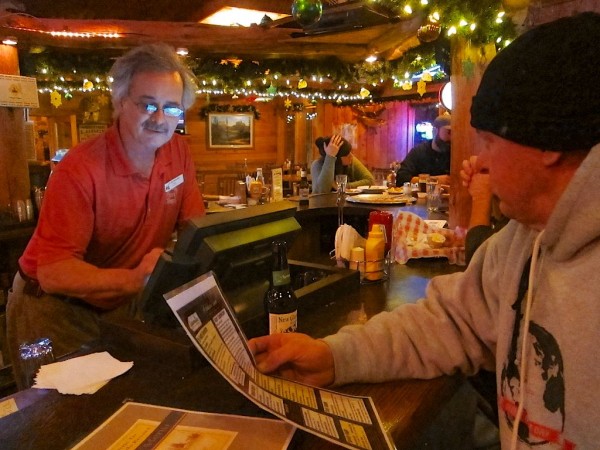
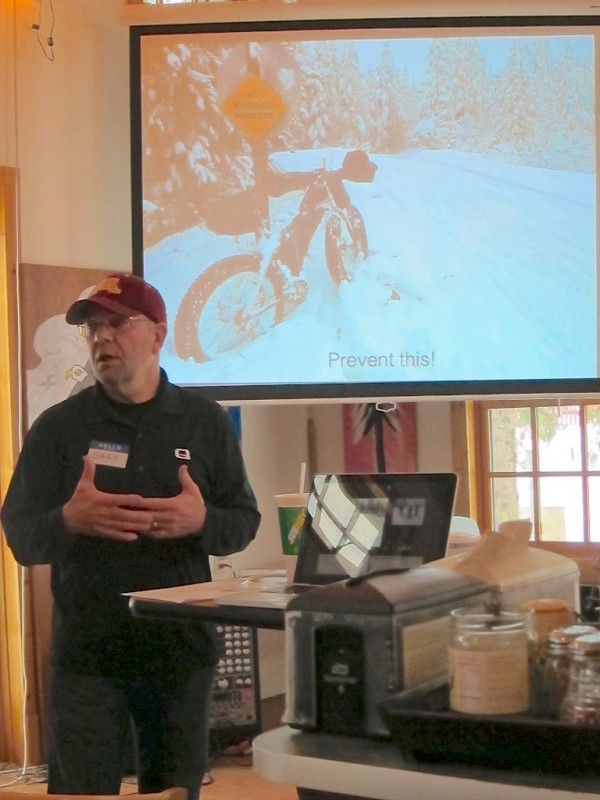
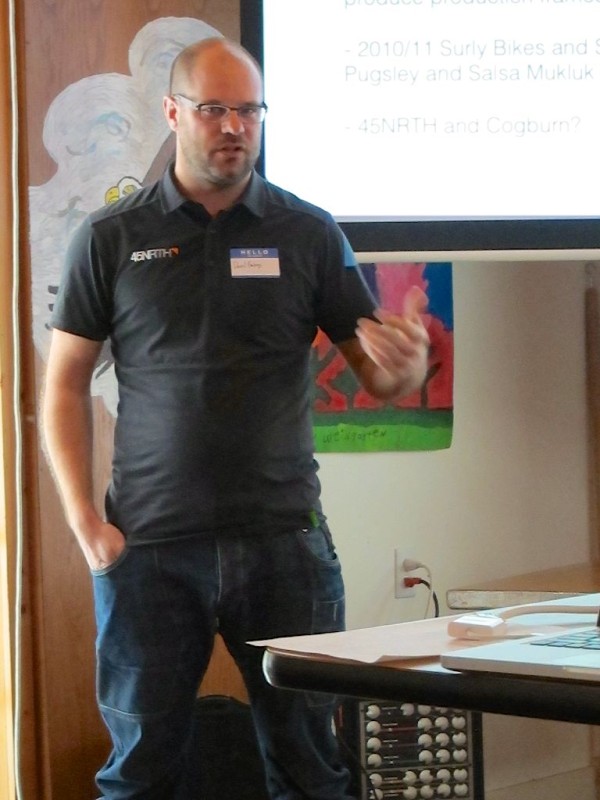
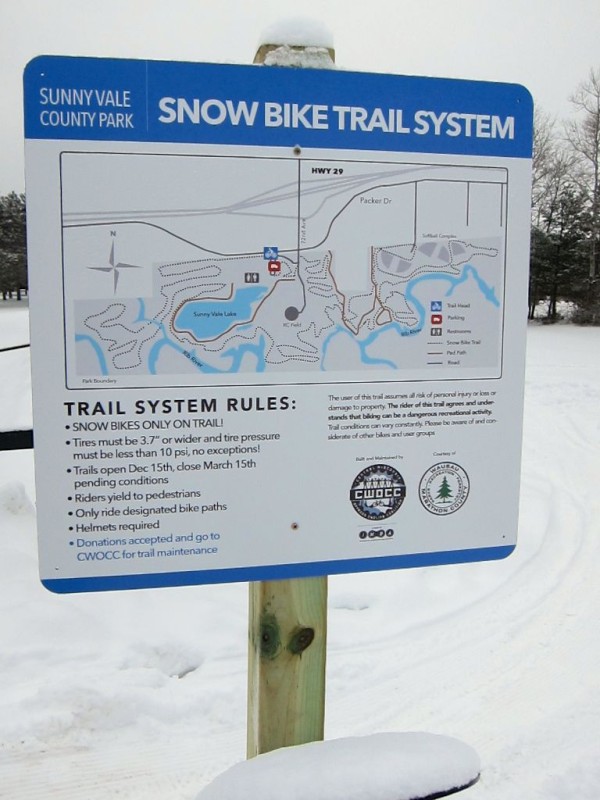
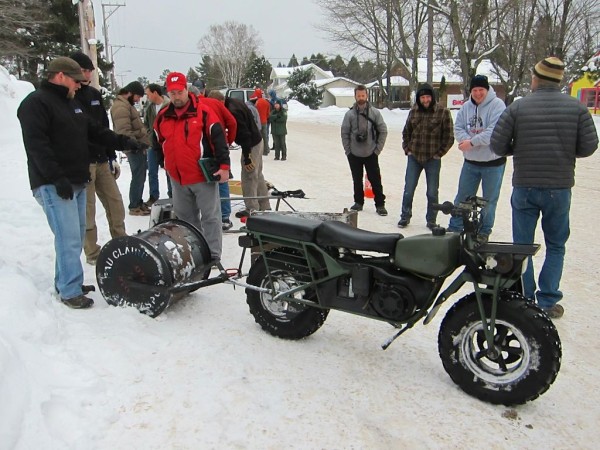
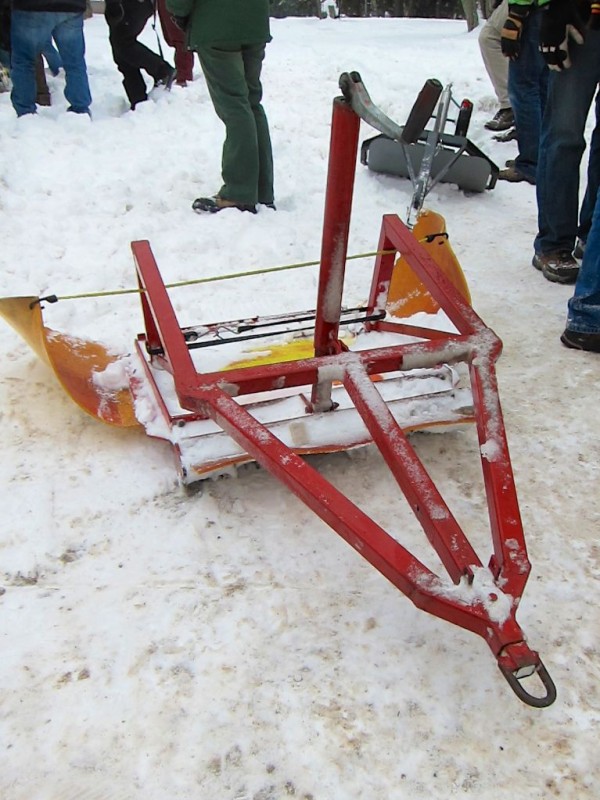
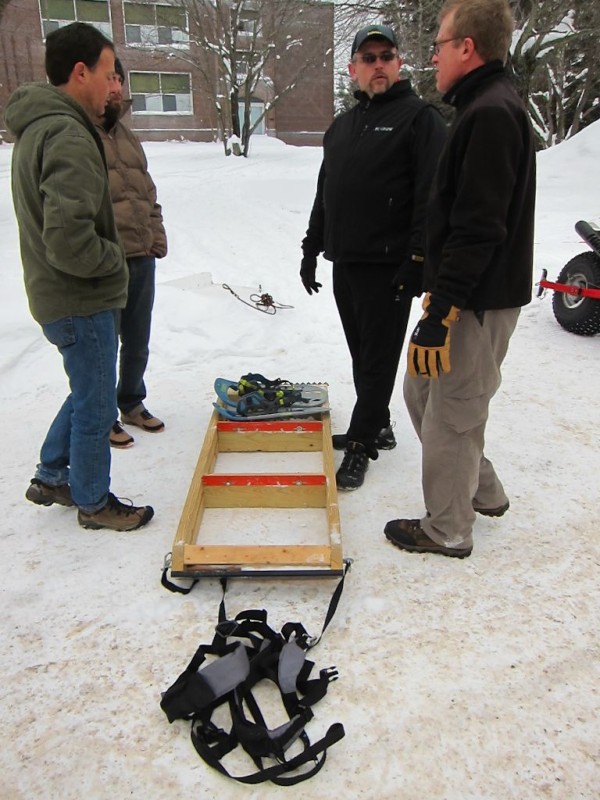
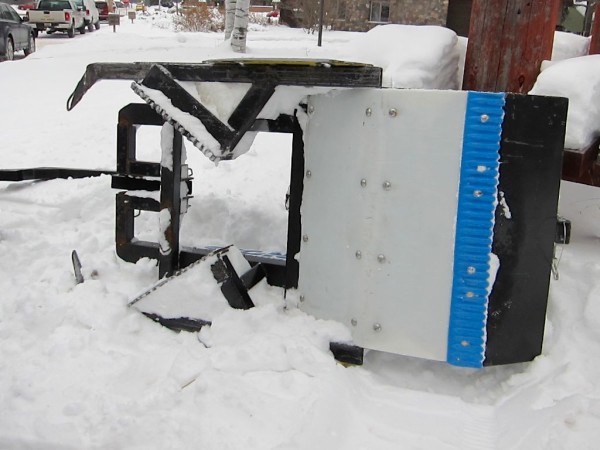
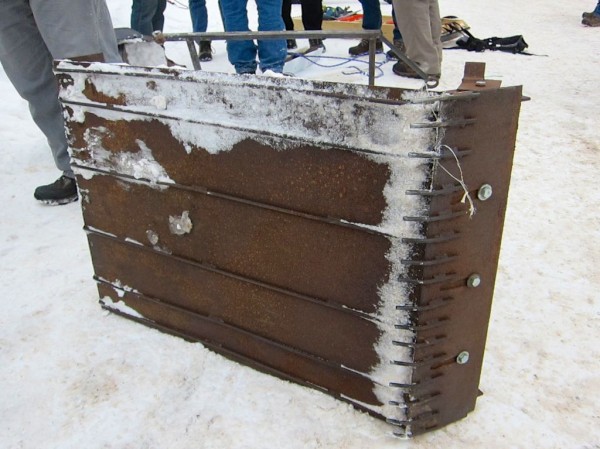
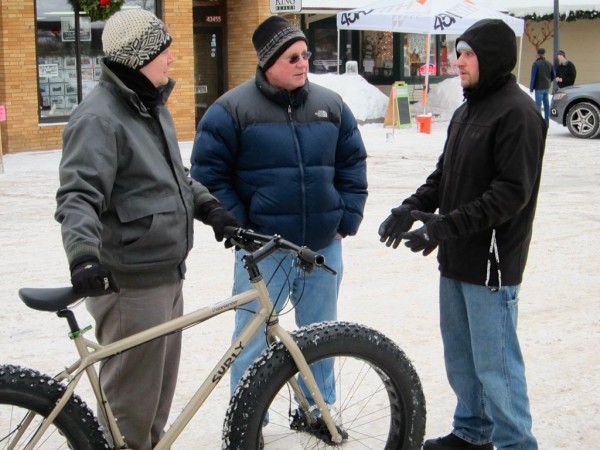
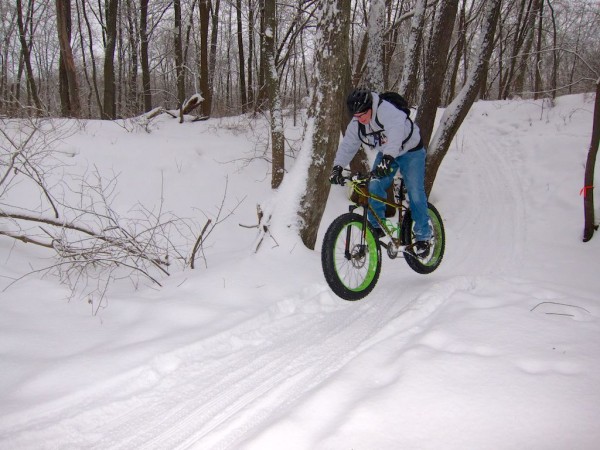
Chris, do you have any experience grooming with the Coleman Minibike? If so, we’d love to hear about it.
Steve, good idea about the golf course angle. We went to an event in Michigan a couple of years ago that was held on a golf course and it made for a super course.
Sven
You got a typo my friend. Cuyuna
And it’s “snow zombies “
Thanks, Liz. I fixed the typo and corrected the Zombie reference!
A minibike uses a centripetal clutch, it will not pull any kind of a load or climb a hill
Is there anyway to share the groomer designs here? Our club in central Ontario would like to look into doing something likes this…
Thanks.
Wayne, we will be talking to several of the trail crews and leaders that we met at the conference in more depth about their grooming practices. I can say that most of them are very resourceful and that conditions at each trail do a lot to determine what is possible and, to some extent, influence the design a particular club uses. Look for more info coming soon.
LOVE this article! Been self grooming w/ snow shoes for years. “Snow Drought” right now in the PNW… believe it or not, kind of missing this chore.